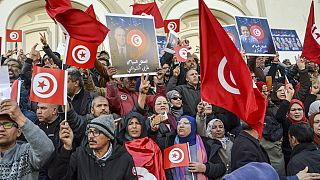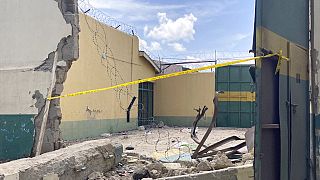Tunisia
Noura paces around the center of Tunis in search of milk. "When I find it, I can not buy more than two bricks," she said about a shortage that illustrates the plight of a sector "in slow collapse.
The Tunisian market absorbs 1.8 million liters daily while production reaches a maximum of 1.2 million, according to official data.
"Milk is essential, especially for our children," Noura Bchini, a housewife in her fifties, told AFP. Near her, another customer, Leila Chaouali, says she gets it "but at specific times, especially in the morning. The afternoon there is more.
This shortage came to light in late October when supermarkets have posted the injunction: "two bricks of milk per citizen.
40 km west of Tunis, Mohamed Gharsallaoui, a farmer in the village of El Battan, leaning on his milking machine, explains that he has had to sell four cows in recent months to buy fodder and feed his twenty animals.
On his farm, this 65-year-old farmer shows his invoices for hay, barley or corn-soya supplement, which he is struggling to pay.
The price of a 50 kg bag of supplement has increased eightfold in 10 years, reaching 81 dinars (24 euros).
"Why do we lack milk? Because the cows are not given the quantities of food they need," he explained to AFP.
"At a loss"
From 30 liters of milk per day, each cow produces only 12. "We provide them with half the previous amount of fodder and grass," he stresses.
A passionate farmer who started 50 years ago with one cow, Gharsallaoui is sad to see his herd wither away.
"These are the cows that used to support my family," says the father of four adult children. "Today I have to send (my children) to work elsewhere to support my cows.
The Tunisian Union of Agriculture and Fisheries (Utap) sounded the alarm a year ago "when farmers began to sell their milk at a loss."
"Animal feed prices have gone crazy with 30 to 40% increase over a year. This is related to the international situation, the war in Ukraine in particular," which has caused the price of cereals, which Tunisia is a major importer, said his spokesman Anis Kharbeche.
He is concerned about the month of Ramadan, which will begin around March 22, "during which the consumption of milk increases and where the shortage will reach one million liters per day.
These difficulties are exacerbated by the drought in Tunisia, with dams filled to a maximum of 30%, according to Utap.
"Fresh grass"
To limit their losses, many farmers are forced to sell part of their livestock, either to local butchers or to breeders in neighboring Algeria.
According to Utap, the Tunisian herds have been reduced by 30% in 2022.
Faced with this "slow collapse", the state, which had supported after independence (in 1956) the establishment of a milk sector, must take the initiative, said Kharbeche, recalling that Tunisia managed to export milk some years until 2017.
For the moment, the state has been content, in the Finance Act 2023, to lift taxes on the import of milk powder, at the risk of competing with local production.
And recent statements by President Kais Saied attributing to "speculators" unidentified problems of the sector have not reassured farmers.
For Utap, the solution would be "a variable price" applied by the State to milk purchases, which would fluctuate according to the price of animal feed. And it would be necessary to "help farmers for the production of fresh grass", with a strategy of reprocessing wastewater and support them in the purchase of food supplements.
Milk is only one of the products affected by sporadic shortages in recent months, alongside coffee, sugar and oil.
Experts explain them by a lack of liquidity of the Tunisian State, which has the monopoly of the supply of subsidized basic products. Heavily indebted, the country has been negotiating for months a loan of almost 2 billion dollars with the IMF.











11:08
Is Africa’s soil healthy enough for food security? [Business Africa]
01:56
Ivory Coast: Women cooperative for vegetables transforming rural village
02:05
Zimbabwe: El Nino-linked drought threatens maize production
02:24
Zimbabweans forced to use US dollar in absence of new currency ZiG
01:14
Poll shows Egypt's March inflation figures expected to edge upwards
01:13
Ivory Coast to increase official farmgate cocoa price